2 months by cncdivi
In just a few days, we received nearly 700 votes for approximately 75 distinct end mill brands. This survey turned out to be one of our most popular ones ever.
Here are the results:
Major Brands
The Major Brands accounted for 75% of the votes. The breakdown is as follows:
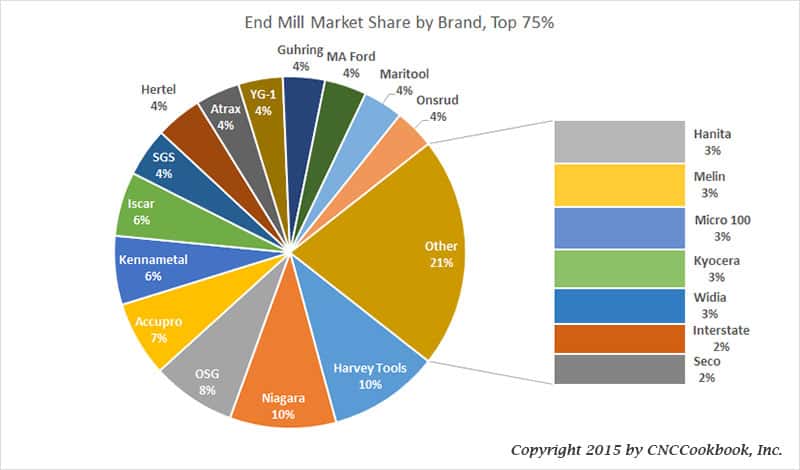
Major brand market share: these brands accounted for 75% of all votes…
The top two brands are Harvey Tools and Niagara, followed pretty closely by OSG, Accupro, Kennametal and Iscar.
Minor Brands
The remaining 25% of votes were cast for the following brands:
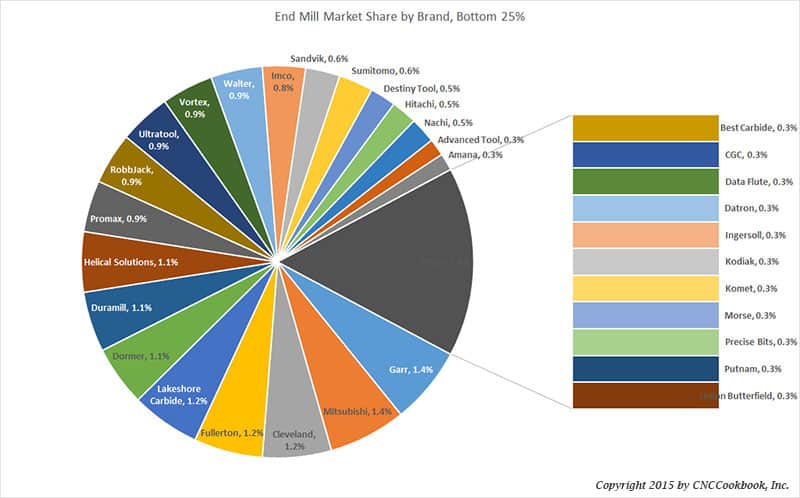
These brands account for the remaining 25% of votes…
Conclusion
There are a lot of different end mill brands in use out there. And nobody has the market sewn up by any means. Some are premium brands and some are economy brands. FWIW, I collected price information on a bunch of these brands, and looked specifically at 1/2″ diameter carbide 4 flute end mills. I chose uncoated where possible and generally was looking for the lesser priced models in any particular brand’s lineup.
A number of things stood out from the pricing analysis and going through the catalogs enough to find the standard model I was pricing:
– The average price of an End Mill of this kind was $63.89.
– The cheapest End Mills were in the $20-30 range, and often included a TiAlN coating at no extra charge. I know for a fact (having used at least one of these brands heavily and seen many good things reported about them) that you can buy a decent end mill in this range.
– You can get decent carbide end mills with coatings so cheaply it’s hard to see why people buy much HSS, yet it seems to be out there. I have written about certain advantages for them, and there are definitely cases where they’re preferably to carbide, particularly if your spindle speed is limited and you’re working soft materials. But given the prices, it’s hard to pass up using carbide for nearly every application.
– The most expensive ones were over $100, and ranged from $120 to $174. This was typically due to exotic coatings and other features. Like I said, some brands are premium and some are economy. There are many reasons a premium end mill might cost more in terms of what it costs to make them. The question you have to ask yourself is whether all that goodness is translating to something you value for your work. Is the expensive end mill enough faster to be worth the cost? It probably doesn’t take too much before this adds up in a hurry, especially if you’re working tough materials. Another question would be whether the exotic end mills last enough longer to justify their price. It’s probably going to be some combination of these things plus perhaps some other special quality (perhaps an extra long reach for that ridiculously deep pocket) that lead you to the premium end mills. Just remember, they can cost a lot more money.
Speaking of all that, you spend $60 odd on average for a 1/2″ end mill. What’s it worth to you to get that end mill to perform better (higher MRR, better surface finish, or whatever “better” means to you) or last longer? I ask because it doesn’t take much at these prices before you’ve easily paid for a 1 year subscription for our G-Wizard Calculator software out of either running your jobs more efficiently or saving on broken end mills.
I get so many notes from shops telling me what a difference G-Wizard has made for them. Some report tens of thousands of dollars of savings on their jobs in a very short time. One fellow recently wrote to chide me somewhat humorously that because G-Wizard was so good the shop owner was making him go through all their old part programs and re-run the CAM with new G-Wizard Feeds and Speeds so they could pick up the savings on recurring jobs. They were definitely impressed with what was possible.
Give G-Wizard a try. We have a free trial that makes trying it very easy:
Take me to the G-Wizard page so I can check it out
[/et_pb_text][/et_pb_column][/et_pb_row][/et_pb_section]Like what you read on CNCCookbook?
Join 100,000+ CNC'ers! Get our latest blog posts delivered straight to your email inbox once a week for free. Plus, we’ll give you access to some great CNC reference materials including:
- Our Big List of over 200 CNC Tips and Techniques
- Our Free GCode Programming Basics Course
- And more!
Just enter your name and email address below:
100% Privacy: We will never Spam you!

Bob is responsible for the development and implementation of the popular G-Wizard CNC Software. Bob is also the founder of CNCCookbook, the largest CNC-related blog on the Internet.


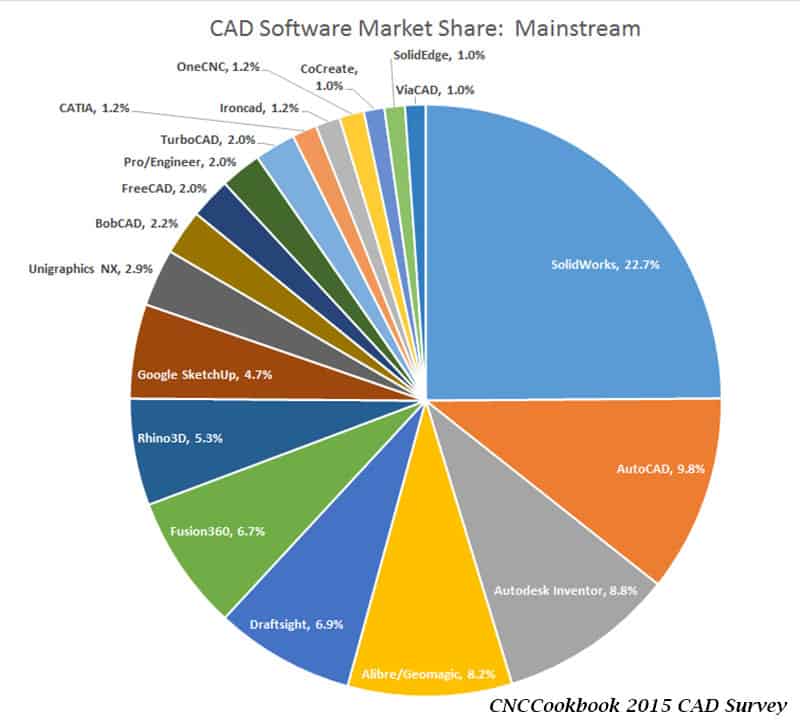
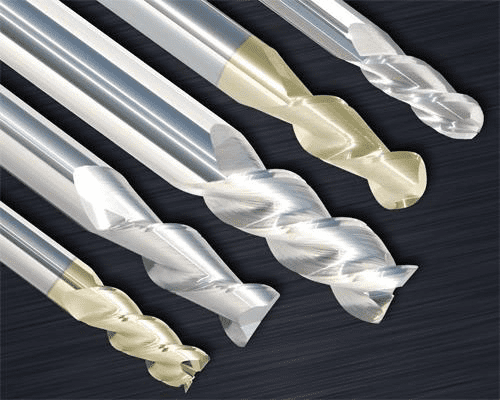
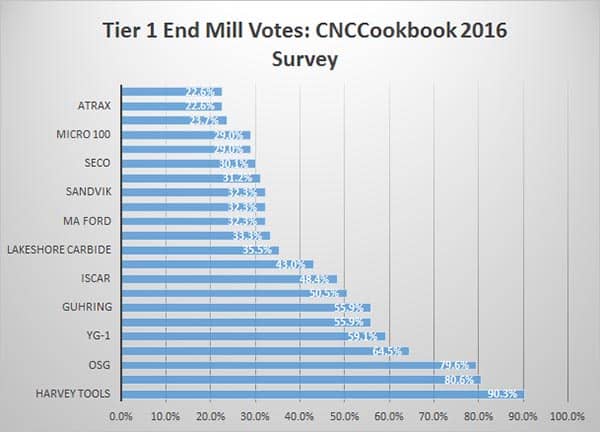
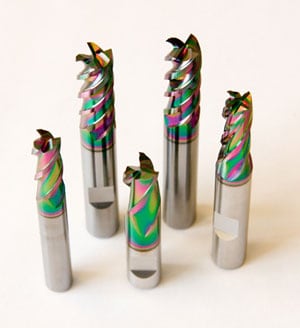

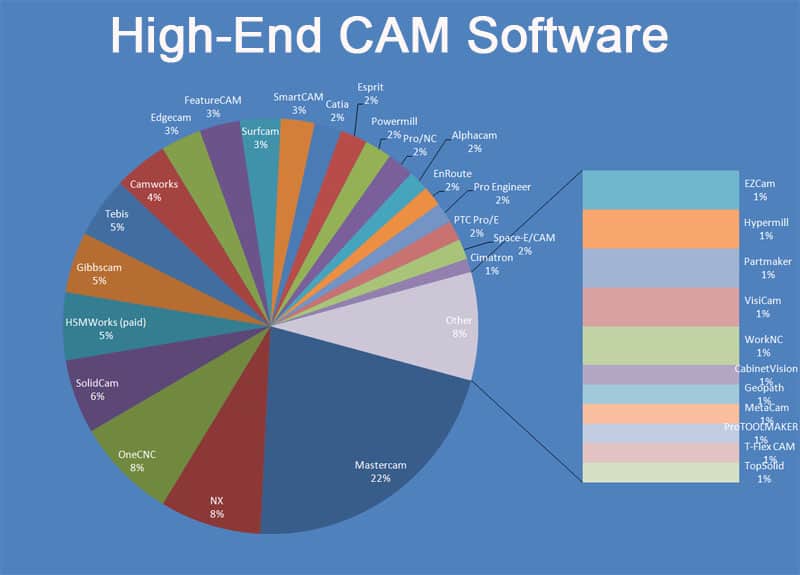
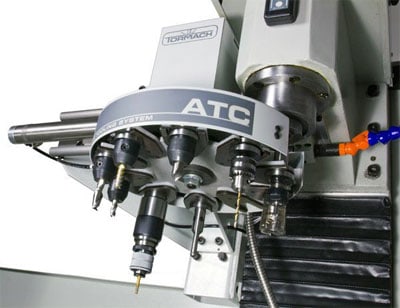
Accupro has beaten all of the competitors except Harvey – I will now go buy some. Thanks for the vote!
had to grin when I read your following remarks:” One fellow recently wrote to chide me somewhat humorously that because G-Wizard was so good the shop owner was making him go through all their old part programs and re-run the CAM with new G-Wizard Feeds and Speeds so they could pick up the savings on recurring jobs.”
I did this in Oct 2013… then we tracked the 3 biggest of those jobs’ time Oct ’14 .. after adjusting for different part qty, it took 5.8% less time to time to run those jobs with GW than without. this is a significant cost savings – and I suspect it was actually greater, as we didn’t have part scrap data, or tool wear/breakage data to compare – but I know for a fact that our scrap rate has fallen to near zero. Plus since we began using GW a number of years ago, our tool rep has lost weight – he’s not eating as regularly, because we’re not replacing nearly as many tools since we subscribed to GW.
Thank you for the kind words, Tom!
I am really surprised more people don’t use IMCO. We use their Pow-r-feed endmills almost exclusively. All 316,304, and 17-4 stainless steels. Cuts like butter at super fast feed rates.
What?! Where’s Harbor Freight on those pie charts?! Come on…admit it…you own a set too…Everyone does…
Jay, I can say with pride I never bought a no-name end mill assortment in a wooden box, LOL. Not that I haven’t bought other things from Harbor Fright.
It is interesting nobody had written it in when I analyzed the results. OTOH, maybe those who tried them never got them to work well enough that they could claim to have “used” them.
I’m guessing the majority of tools are selected for price/availability/brand name reasons, via a menu at MSC or Enco, rather than due to a wealth of experience evaluating a multitude of tools. I’d like to see the results of a survey (or rather an array of surveys), where people suggest the optimum tool per a given scenario.
For instance, I machine almost exclusively 6061 aluminum, using near-dry mist, and a 6K max spindle speed. Buying a faster spindle isn’t in the budget, and I don’t have any desire to deal with flood liquids. In this particular scenario I find that even 2 flute end mills are prone to clogging up. Single flute carbide end mills, particular the Onsrud 63-6xx series work really well for me, day-in day-out no peeking. Yes, 3 flute end mills are recommended for aluminum, and indeed they really chew through the material, but they clog up so frequently I can’t make use of them without having to babysit the machine.
On the other hand, some people are doing nothing but mild steel, others stainless, some flood, some dry.
While it’s mildly interesting to see what brands people buy in general, I’d be thrilled to see some specific suggestions from people who have had successes or failures using different tools in my particular niche. At times I’ll machine fixtures, etc., using other materials, and I’d sure like to see what works for for other people, so I can pick that tool.
Thanks for providing a great service via your software, and blog!
Mark, looking at the back and forth on Facebook, I’m not too sure we’d get a much more reliable result asking for optimum endmills. Everyone’s calling out all sorts of brands and claiming they’re optimal, LOL.
I do know you can machine 6061 without having to baby sit with a 3 flute unless you just happen to have gotten a bad batch. Your problem is the lack of fluids. The aluminum wants to weld itself to your endmill and needs a lubricant to avoid that. You can get by with just compressed air if you get absolutely paranoid about clearing chips and keep passes relatively shallow. Mist is many times more reliable though and no flood needed.
I have to agree with Bob on this. I cut aluminum most of the time to make parts for signs, and using a heavy mist greatly improves performance and life span of the endmill. I use Vortex tools because they are fairly affordable at around $30 for a 1/4 shank single flute aluminum bit that can chew through aluminum. The edge finish is moderate, but that is just fine for most jobs and I can run it at around 100ipm through .125 or .080 in one pass. The coolant I use is trim-mist, it works fairly well but its basically just soapy water it seems, but its low mess and lubricates nicely and doesn’t leave a residue. I also vacuum up my chips though, with an old carwash vacuum cleaner. Motors are cheap and the cfms achievable with 2-3 motors surpass shopvacs, while still being cheaper. The design also lets you suck up wet or dry chips since they’re designed for people to abuse them already.
I’ve been using Atrax (bought from Enco) for quit a while, but recently started buying from onlinecarbide.com via eBay. I first went to them for some thread mills, but have found their endmills very economical. Bob’s “standard” 1/2″ 4-flute is $17.95. $10 more for TiAlIn..
1/2′ Variable Flute, Coated, 4 flute.
Destiny Tool = $54
Mari Tool = $43
Destiny roughed 182 pieces
Mari Tool roughed 124 pieces
Although the Destiny cost $11 more they ultimately cost $.05 less per part.
I like Mari Tools product lineup and their website but sometimes it pays to spend more.
I’m very surprised in all the private label companies on the list that claim they make endmills but really just sell someone elses no name brand.
glad to see SandviK going down,—– overpriced junk tools.